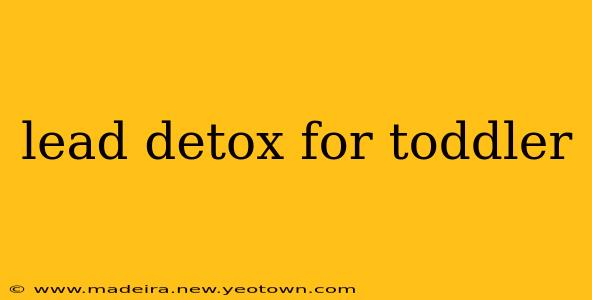The discovery that your toddler has been exposed to lead can be incredibly frightening. Lead poisoning is a serious issue, and the thought of your little one suffering its effects is understandably terrifying. But before you panic, know that there are steps you can take to support your child's body in processing and eliminating this heavy metal. This isn't about a "quick fix" detox, but rather a comprehensive approach focused on minimizing lead's impact and promoting overall health. This guide will explore strategies for supporting your toddler's body through this challenging time. Remember, consulting with your pediatrician or a qualified healthcare professional is crucial throughout this process. They can perform tests to assess the level of lead exposure and recommend the most appropriate course of action.
What are the signs of lead poisoning in toddlers?
Lead poisoning often presents subtly, making early detection challenging. However, some common signs to watch out for include:
- Developmental delays: This can manifest as slower than expected milestones in speech, motor skills, or cognitive development.
- Irritability and behavioral changes: Your normally cheerful toddler might become unusually fussy, aggressive, or withdrawn.
- Loss of appetite: A sudden decrease in food intake can be a warning sign.
- Anemia: Lead interferes with the body's ability to produce red blood cells, leading to fatigue and paleness.
- Stomach pain: Abdominal discomfort is another potential symptom.
It's vital to note: Many of these symptoms are non-specific, meaning they could be indicative of various illnesses. If you suspect lead exposure, contacting your doctor immediately is paramount. They can conduct appropriate testing to confirm or rule out lead poisoning.
What foods help remove lead from the body?
While there's no magic bullet to instantly remove lead, certain foods can aid the body in its natural detoxification processes. These foods are rich in nutrients that support overall health and help minimize lead's effects:
- Calcium-rich foods: Milk, yogurt, cheese, and leafy greens help block lead absorption in the gut. Providing your toddler with plenty of calcium-rich options is essential.
- Iron-rich foods: Iron helps in the production of red blood cells, counteracting the anemia often associated with lead poisoning. Include foods like red meat (if appropriate for your child's diet), beans, and lentils.
- Fiber-rich foods: Fiber aids in the elimination of toxins from the body. Fruits, vegetables, and whole grains are excellent sources.
Remember, a balanced and nutritious diet is key to supporting your toddler's body during this time. Avoid giving them processed foods, sugary drinks, and excessive amounts of fast food.
How can I reduce lead exposure in my home?
Preventing further lead exposure is as important as supporting your toddler's body in eliminating what's already present. Here are some steps to minimize lead in your environment:
- Dust regularly: Lead dust is a common source of exposure. Regularly dust and vacuum your home, paying close attention to areas where your toddler plays.
- Wash toys and hands frequently: Clean your toddler's toys and encourage frequent handwashing.
- Test your water: Lead can leach into drinking water from old pipes. Consider having your water tested.
- Identify potential sources: Assess your home for potential lead sources such as old paint, contaminated soil, or lead-based toys or utensils.
What is chelation therapy?
Chelation therapy is a medical procedure used to remove heavy metals, including lead, from the body. It involves administering medications that bind to the lead, allowing it to be excreted through urine. Chelation therapy is only administered under strict medical supervision and is not something to undertake at home. Your pediatrician will determine if chelation therapy is necessary based on the severity of your toddler's lead levels.
What are the long-term effects of lead poisoning on toddlers?
Lead poisoning can have significant long-term consequences, affecting a child's development and overall health. Potential long-term effects include:
- Cognitive impairment: Learning disabilities and reduced IQ are potential outcomes.
- Behavioral problems: Attention deficit hyperactivity disorder (ADHD) and other behavioral issues can arise.
- Kidney damage: Lead can damage the kidneys over time.
- Hearing loss: Lead exposure can contribute to hearing impairments.
This is a critical time for your toddler. By working closely with your pediatrician and implementing these strategies, you can help your little one overcome this challenge and thrive. Remember, proactive measures, consistent monitoring, and a nutritious diet are your strongest allies in supporting your child's health. Early detection and intervention are key to mitigating the long-term effects of lead exposure.

